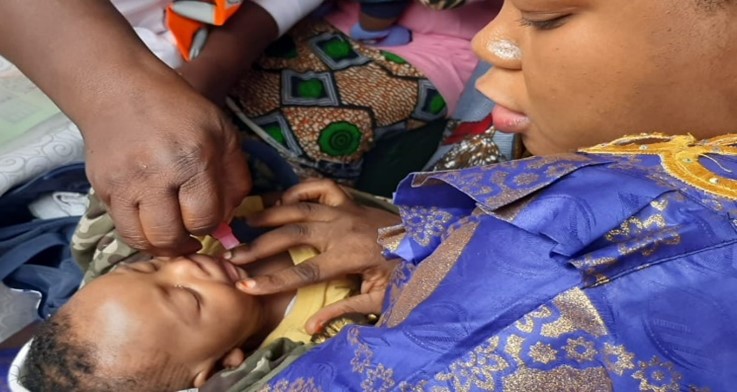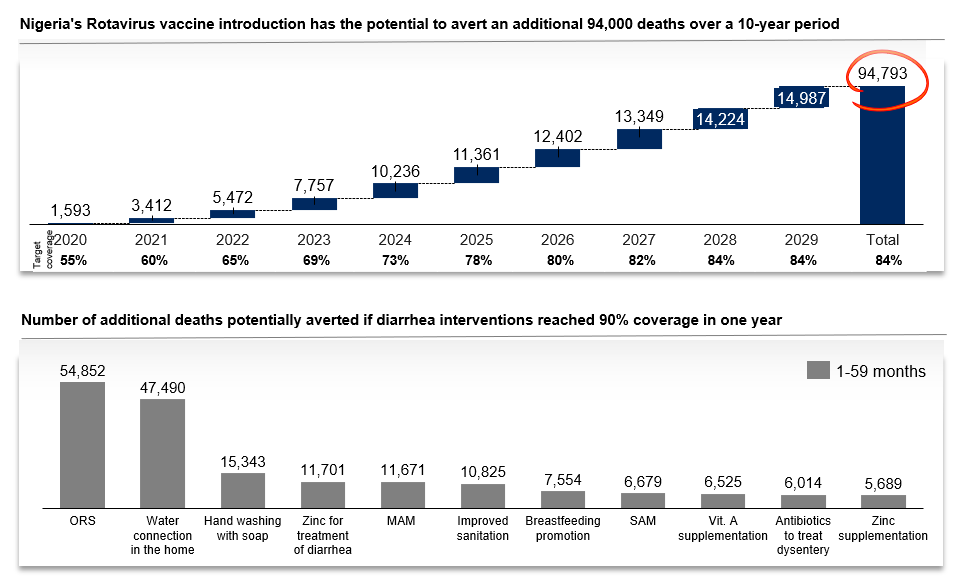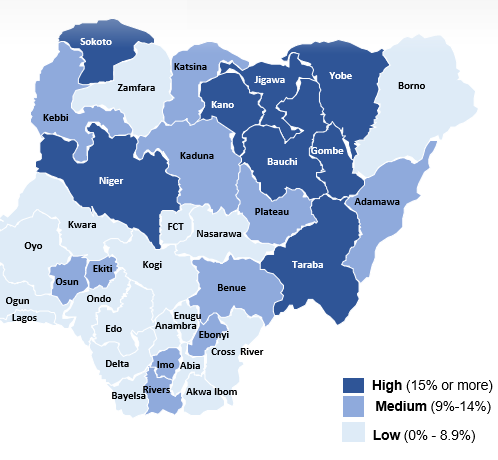
Nigeria writes a new chapter for child health with the introduction of rotavirus vaccine

Baby Abdullahi being vaccinated with five drops of rotavirus vaccine during the official launch. Photo: CHAI/Dr. Belinda Uba.
Author: Omotayo A. Giwa, Program Manager-Vaccines, Clinton Health Access Initiative (CHAI)Countributors: Dr. Owens Wiwa, Executive Vice President & Country Director, Clinton Health Access Initiative (CHAI); Haj. Binta Ismail, Program Manager, National Emergency Routine Immunization Coordination Centre (NERICC-NPHCDA).
The day that we have been working so hard to prepare for has finally arrived: the introduction of rotavirus vaccine into Nigeria’s Expanded Program on Routine Immunization. The Clinton Health Access Initiative (CHAI) congratulates the Executive Director and CEO of the National Primary Health Care Development Agency (NPHCDA), the World Health Organization, and all other stakeholders for Nigeria’s successful launch of World Immunization Week, popularly called “African Vaccination Week,’’ and the official launch of Rota Virus Vaccines (RVV) in Nigeria.
For years, Nigeria has remained among the countries with the highest burden of diarrhea, including rotavirus, the most lethal form of severe childhood diarrhea. Of all countries, Nigeria has the second highest number of deaths from rotavirus diarrhea, accounting for 14% of all childhood rotavirus deaths worldwide.
Starting today, a new timeline begins: over the next decade, rotavirus vaccine has the potential to save nearly 100,000 children’s lives in Nigeria. That number increases when we add other diarrhea prevention and treatment tools.
 The top graph represents a CHAI Vaccine Analysis using the Lives Saved Tool. The bottom graph includes figures from CHAI’s Essential Medicines Missed Opportunity Analysis.
The top graph represents a CHAI Vaccine Analysis using the Lives Saved Tool. The bottom graph includes figures from CHAI’s Essential Medicines Missed Opportunity Analysis.
We know that vaccines will make the most impact where the disease burden is highest. That’s why today we began with first phase of introduction in Nigeria’s Northern states. Three months from now, we will roll out the vaccine through the rest of the country. This staggered approach will also allow us to incorporate lessons learned from the first round of vaccine delivery and streamline our approach in the Southern states.
 Rotavirus vaccination will begin in Nigeria’s Northern states, where disease burden is highest. Source: Nigeria Demographic Health Survey, 2018.Moreover, we knew we didn’t want this rotavirus vaccine introduction to occur in isolation. Recent WHO/UNICEF data on lowered vaccine coverage during the pandemic tells the story of how so many countries have struggled to maintain essential health services alongside COVID-19, conflict, climate change, and so much more. We have embedded the rotavirus vaccine introduction into a broader push to revitalize routine immunization: African Vaccination Week (AVW 2022). Vaccines are only as effective as the primary health care (PHC) systems that put them within reach of each child.
Rotavirus vaccination will begin in Nigeria’s Northern states, where disease burden is highest. Source: Nigeria Demographic Health Survey, 2018.Moreover, we knew we didn’t want this rotavirus vaccine introduction to occur in isolation. Recent WHO/UNICEF data on lowered vaccine coverage during the pandemic tells the story of how so many countries have struggled to maintain essential health services alongside COVID-19, conflict, climate change, and so much more. We have embedded the rotavirus vaccine introduction into a broader push to revitalize routine immunization: African Vaccination Week (AVW 2022). Vaccines are only as effective as the primary health care (PHC) systems that put them within reach of each child.
Immunization is also where other PHC services have an opportunity to converge, including maternal, newborn, and child health; reproductive health; nutrition; HIV/AIDS control; community-targeted services; non-communicable diseases, and general services. For AVW 2022, Nigeria’s National Primary Health Development Agency (NPHCDA) will promote these PHC tools to improve health outcomes throughout a person’s life, from infants to the elderly.
We acknowledge the great contributions from Gavi, the Vaccine Alliance, the donor community, and implementing partners supporting the government to transform healthcare delivery, quality of care for all, and save lives.
The work continues. But today, we celebrate, and pause in gratitude for all the little lives who will grow to reach their full potential thanks to this great investment in Nigeria’s children.


